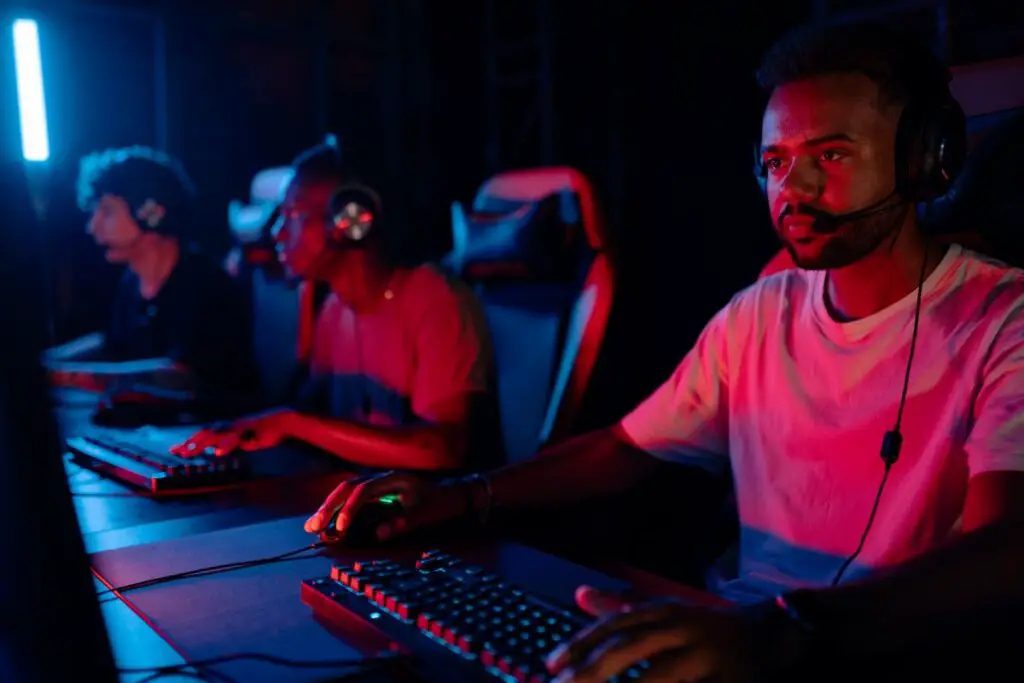Video Gaming Fun Can Enhance Social Skills for Autistics
Playing video games and esports is sometimes considered as unproductive or even a complete waste of time to a person’s day. But, for many individuals, and especially for people on the autism spectrum, video gaming fun can provide positive mental stimulation and even enhance social skills.
 Video gaming fun and esports can benefit individuals with developing strategies and provide positive stimulation, much like playing a good game of chess. Depending on the game selected, a video game can also be a source of peace and relaxation, much like a good meditation session.
Video gaming fun and esports can benefit individuals with developing strategies and provide positive stimulation, much like playing a good game of chess. Depending on the game selected, a video game can also be a source of peace and relaxation, much like a good meditation session.
Video gaming fun can create a variety of emotions and sensations, especially with the newest virtual reality types that put you into the game itself—allowing individuals to experience video games in a way that was never possible before.
Whether a person prefers the latest immersion types, action genres, sports, or retro styles (Pac Man, anyone?), there’s some type of video game fun for everyone!
There are so many games that can bring joy and entertainment for individuals of all ages and abilities, which is why gaming is such a massive industry. Autism and video games is also a popular combination.
Did you know the video game industry is bigger than the movie, music and sporting industry combined? A lot of people may not realize it, but the video game industry continues to grow at a rapid pace, thanks to the extreme rise in popularity of free-to-play games, multiplayer options, and eSports.
The success was propelled by the pandemic as well, when people could no longer go out and were looking for ways to be entertained from the comfort of their own home but even before that it was a massive industry that dwarfed all others.
Current numbers predict the gaming market is expected to reach $245.10 billion in 2023, with more than 400 million new gamers. There are currently about 2.7 billion people globally who play video games.
The market is expected to be just as strong, if not more so, in 2024, in part due to updated gaming consoles and new games, increasing video gaming fun. Also, inflation and possible recession can make for a less expensive night when comparing video gaming fun vs. a night on the town.
Having said all that, you can see why some parents and adults grow concerned about autism and gaming and exploring why kids are watching videos of people playing video games instead of playing outdoors or being creative themselves.
For some, a simple explanation can be likened to the Super Bowl. You and many other people watch people play football instead of playing it themselves, and just like football there are sport tournaments around video games called Esports.
People can make millions of dollars just like people who win the Super Bowl, and little kids aspire to win and become famous athletes (either for real or virtually).
Gamers can make lifelong friends through online connections. An added bonus is that individuals of all ages can talk to and make friends from all over world while playing video games. So when you think about it that way, football and video gaming fun aren’t all that tremendously different after all.
So keep an open mind about video games like you should about many things. Maybe buy an Xbox or a PS5, or a gaming PC, and try some games yourself. You might just find your favorite hobby. For me, I’ve been playing the new Spider-Man 2 game that was released in October 2023, and it is truly entertaining!
While playing video games are sometimes stereotyped as mindless entertainment or even an unhealthy addiction by some, research has shown that playing video games can actually provide many benefits for people with autism spectrum disorder (ASD).
When chosen carefully and played in moderation, video gaming fun can help improve social skills, focus, and more for autistic gamers.
Video Gaming Fun and Esports Can Improve Social Interaction and Communication
 One of the key challenges for people with autism is difficulty with social interaction and communication. Face-to-face conversations can cause stress and anxiety, which further hinders individuals’ ability to interact. Autism and video games provide a safer and more controlled space to practice these skills without as much anxiety.
One of the key challenges for people with autism is difficulty with social interaction and communication. Face-to-face conversations can cause stress and anxiety, which further hinders individuals’ ability to interact. Autism and video games provide a safer and more controlled space to practice these skills without as much anxiety.
Many popular video games involve communicating with other players via chat or voice chat. Games like World of Warcraft, Valorant, and Fortnite require teamwork and coordination with both friends and random players online.
This allows autistic gamers to practice conversing, taking turns, and reading social cues in a structured environment. Over time, these interactions in the virtual world can help improve their communication abilities for real world conversations.
Playing cooperatively with other gamers requires many social skills like using appropriate language, understanding different perspectives, and resolving conflicts. The conversations are focused on specific game objectives which makes them more predictable than real world small talk.
For those uncomfortable with voice chat, text chat provides a chance to practice writing dialog. Starting with anonymous online interactions can build confidence to eventually transfer those skills to in-person conversations and friendships.
In addition to chatting with other players, modern story-based games use extensive dialog trees that encourage practicing listening skills and responding appropriately. Because the possible responses are limited rather than open-ended, it reduces the anxiety autistic players may feel in unstructured dialog.
Overall, the diverse social interactions in different gaming genres provide great opportunities to continuously learn and improve social competencies.
Autism and Gaming Can Leverage Visual Learning Strengths
Many individuals on the autism spectrum demonstrate strong visual learning abilities. Their brains are better wired to process visual information compared to text or speech. Autism and video games together cater perfectly to this strength by immersing players in dynamic virtual worlds full of stimulating sights and sounds.
The expansive 3D environments in popular games like The Legend of Zelda, Fallout, and Fortnite create an engaging space to explore using one’s visual perception skills.
Important objects and characters pop out with bright colors or flashing indicators that captivate attention. Layouts and pathways make use of visual patterns and borders to provide structure and order.
Cutscenes and cinematics further the storytelling through dramatic visual sequences paired with music and sound effects for added sensory impact. These forms of visual communication enrich the gaming experience.
For some genres like racing games, spatial awareness becomes important as players have to grasp distance, speed, and positioning. Mastering these gameplay mechanics relies heavily on visual processing capabilities.
Even basic games like Tetris require visual skills to plan where shapes will fit best.
The stimulating graphics and animations grab and hold attention so well that visual learners will be engaged for hours. This can facilitate greater focus, pattern recognition, and information retention compared to traditional teaching methods.
Overall, video games provide an excellent outlet to exercise and refine innate visual strengths.
Autism and Video Games and Esports Can Provide Structure through Patterns and Repetition
Many individuals with autism thrive when there is structure, routine, and established patterns. The very nature of most video game design and esports aligns well with this need. Games introduce core mechanics and rules that govern the virtual world.
Players then apply these rules through repetitive actions like choosing dialog options, battling enemies, or solving puzzles.
The clearly defined choices and limited options reduce anxiety around making decisions. The predictable cause and effect from choosing an action creates a sense of control.
Each action results in a predetermined outcome or reaction in the game. This certainty provides comfort versus the uncertainty of real world interactions.
Additionally, games rely heavily on doing the same actions repeatedly to master skills or progress through the game. This grind or repetition would seem boring to neurotypical gamers but offers satisfying predictability to those with autism.
Many game genres from action RPGs to simulation games involve constantly repeating tasks like building up a base or character.
While neurotypical players may favor novel experiences, those on the spectrum often prefer sticking to familiar activities. Starting each gaming session doing the same actions like collecting resources or completing side quests establishes routine.
This repetition creates order amidst the chaos and uncertainty of real life. Finding enjoyment in repetitive tasks also cultivates patience and perseverance.
Read more about 6 Signs That You Might Be An Adult with Autism.
Esports and Video Gaming Fun Provides an Outlet for Special Interests
Individuals with autism frequently develop intense, highly specific interests in a particular topic. From transportation vehicles to geology or medieval weaponry, these special interests consume their thoughts and time.
While an obsession may seem unhealthy to neurotypical observers, they provide comfort and meaning for those on the spectrum.
Video games can be a great outlet to dive into specific special interests. There are games built around nearly every topic that allow players to immerse themselves in the details.
Someone fascinated by trains can play classic railroad tycoon games where they design complex rail networks. A military history buff has endless options from Call of Duty to battlefield strategy games set in different wars.
In fact, many popular franchises successfully cater to special interests by creating expansive worlds with extensive lore.
Games like Pokémon and Final Fantasy have spawned books, movies, and toys to fulfill fans’ desire to know everything about the characters, locations, abilities, items, and more. This provides fulfilling mental stimulation and joy.
Did you know that that the creator of Pokémon, Japanese game designer Satoshi Tajiri, reportedly has autism? He has publicly stated that he was obsessed with bugs, and wanted the games to bring the same happiness that he had with his bug collecting of childhood.
Read 6 Fascinating Facts About Autism You Probably Didn’t Know
Playing related video games also offers a way to bond over special interests with family and friends. Instead of just lecturing others about the topic, gamers can share the excitement by having them play cooperatively. This makes the interest more interactive and social.
For those on the autism spectrum, finding a video game that aligns with a specific passion can be life changing. It offers an imaginative space to explore their interest as well as escape from stresses of daily life.
Video Gaming Fun: Channeling Repetitive Behaviors Positively
 Many autistic individuals engage in repetitive physical behaviors like hand flapping, spinning, or rocking. These “stimming” behaviors provide sensory input and relaxation.
Many autistic individuals engage in repetitive physical behaviors like hand flapping, spinning, or rocking. These “stimming” behaviors provide sensory input and relaxation.
While often judged by neurotypical peers, they serve an important self-regulatory function. The key is to have a circle of friends who know your mannerisms and accept you as you are.
Also, make sure you don’t let video gaming rule your life. Remember there is much more to happiness than a game, and interacting with others outside of gaming is a balance you should seek.
Learn more about making a connection and finding third places.
Some researchers have compared stimming to the repetitive behaviors exhibited by neurotypical gamers inputting commands or completing quests for hours on end.
Gaming channels these hand motions into productive tasks like controlling a character, building structures, or collecting resources. This harnesses the desire for repetition as part of the gameplay progression.
The similarity illustrates why those on the autism spectrum tend to excel at and feel drawn to video gaming fun. Their innate need for motion and repetition fits perfectly with pushing buttons to trigger actions on screen.
The physical feedback loop of inputting commands and seeing results gives a satisfying feeling of control.
Additionally, research shows stimming increases when individuals are excited or joyful. Many autistic gamers flap their hands or rock their bodies when they succeed in the game or complete a difficult level.
Gaming provides a fun outlet for these behaviors.
For those who worry repetitive gaming can become addictive, it is important to exercise moderation.
However, it is unfair to judge the joy autistic gamers feel from stimming through gameplay as it parallels the same behaviors in neurotypical gamers.
Playing games makes productive use of these repetitive tendencies.
Recommendations for Using Video Games Effectively
While video games offer many potential benefits for autistic players, there are some recommendations parents and caregivers should keep in mind (or, if an adult, set your own rules so that gaming doesn’t become your life):
- Set reasonable time limits.
It’s important to balance gaming with other activities for a well-rounded lifestyle. Agree upon a reasonable daily or weekly time limit for play. - Review games for age-appropriateness.
Be sure to check out
games thoroughly before introducing them to ensure content is suitable for the child’s age. Avoid realistic violence or depictions that could cause anxiety. - Encourage social play.
Multiplayer games that require communication and coordination with others provide great opportunities to practice social skills. Have children play cooperatively in the same room with siblings or friends. - Find games that align with interests.
Observe what topics fascinate your child and look for related games that can immerse them in that area, whether it’s trains, animals, or geology. This boosts engagement and learning. - Play along sometimes.
For younger kids especially, play together occasionally so you understand their gaming experiences. Also model good sportsmanship and communication during play. - Use games to reinforce strengths.
Choose games that leverage visual processing and pattern recognition abilities. Puzzles, building simulations, and strategy games can strengthen cognitive skills. - Provide structure around gaming habits.
Set expectations around when and where gaming is allowed and how to manage things like stopping play for meals. Clear rules and routines prevent conflicts. - Monitor for addiction or isolation.
Watch for decreased interest in social activities or changes in mood as a sign gaming is becoming excessive. Set rules around healthy device habits. - Use gaming to promote movement.
Games that require physical movement and activity like Nintendo Wii Sports or Just Dance are great for autistic children who need sensory stimulation. - Look for games with customizable controls.
Adjusting game settings to simplify controls or reduce sensory elements helps tailor the experience to a child’s needs.
With some mindful adjustments, video gaming fun can be extremely rewarding. The visuals, patterns, special interests, and repetition align beautifully with an autistic child’s strengths.
Yet balance and parent involvement are still important. By following some best practices, gaming can be safely implemented and optimized to help develop vital real world skills.
Video Gaming Fun: Expanding Beyond Entertainment
While commercial video games provide many benefits to autistic players, specialized games are also being created explicitly for autism therapies and interventions. These serious games use game principles but are designed for specific learning outcomes.
Early research has shown promising results on the value of serious games for improving:
- Facial recognition and emotion identification – Games use avatar interactions and reaction tests to build these social perception skills.
- Conversation practice – Scenarios with avatars and chatbots allow practicing dialog exchanges in a low stress setting.
- Behavioral self-regulation – Games help recognize emotional states and practice coping mechanisms like deep breathing that can translate to real settings.
- Daily living skills – Virtual environments simulate activities like crossing streets, ordering food, and shopping to practice life skills.
- Motor skills – Motion-controlled games help with coordination, timing, balance and other physical abilities.

While these games aim to improve abilities and behaviors directly, they leverage engagement mechanics from entertainment games to motivate play. This makes them powerful tools for learning.
Researchers are also exploring using virtual reality to create immersive simulations for everything from social situations to classroom settings.
These controlled experiences can help develop skills and reduce anxieties before confronting real world complexities. VR holds exciting potential for autism therapies as the technology matures.
Video gaming fun also provides a shared activity for autistic children and their families. Whether it’s bonding over cooperative games or custom designing games in computer workshops, gaming facilitates social connections through common interests.
Shared passion for gaming builds bridges that can strengthen families.
Though still an emerging field, purpose-built games present promising new directions for complementing traditional autism interventions.
While time spent gaming needs balance with non-screen activities, it can provide many benefits for people with autism spectrum disorder. From practicing social skills to visual learning to leveraging special interests, video games are well suited to improving developmental areas that are challenging for those with autism.
With proper guidance from parents and therapists, age-appropriate games can be an enjoyable tool that improves real world competencies. With the rise of virtual reality and innovative game therapies, the possibilities of using interactive digital experiences to help those on the spectrum continue to expand.
If you are an adult with autism, video gaming fun can provide mental stimulation and a chance to connect with others, either virtually or by meeting up at gaming cafes.
As with anything, the key is maintaining balance!
You might also be interested in the following articles:
Misconceptions That Lead To Autism Stigmas and Stereotypes
Learn more about stigmas and stereotypes that autistics face:
- Autism and Holidays: Why Special Occasions Can Be Challenging
- Why Labeling People Can Lead to Stereotyping and Discrimination
- Autism Media Stereotypes: We’re Not All Geniuses, Savants, or Lonely
- Beyond Stereotypes: How Rain Man Revolutionized the Perception of Autism
- Absurd Plot About Autism and Evolution and Why It’s Harmful
- Moving Past the Tired Conspiracy Theory of Vaccines and Autism
- Discover the Powerful Bond Between Autism and Pets
- The Hidden Hurdles: Challenging Autism Stigmas in Today’s Politics
- History of Autism: Revealing Shocking Mysteries from the Past
- Knocking Down the Stigma to Autism Obsession